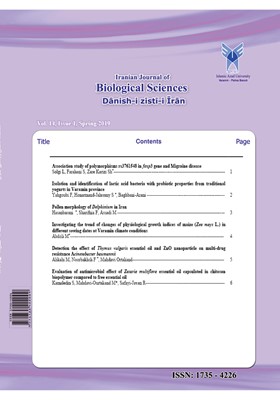Detection the effect of Thymus vulgaris essential oils and Zno nanoparticle on multi drug resistance acinetobacter baumannii
Subject Areas : microbiology
Fatemeh Noorbakhsh
1
*
![]() ,
Mozhgan Alikahi
2
,
Maasuomeh Mahdavi Ourtakand
3
,
Mozhgan Alikahi
2
,
Maasuomeh Mahdavi Ourtakand
3
1 - Department of Microbiology, Biological Science College, Varamin-pishva branch,Islamic Azad University,Varamin-Pishva,Iran
2 - 1. Department of Microbiology, Biological Sciences College, Varamin-Pishva Branch, Islamic Azad University, Varamin-Pishva, Iran
3 - Department of Biology, College of Biological Sciences, Varamin-Pishva Branch, Islamic Azad University, Varamin, Iran
Keywords: "Acinetobacter baumannii", " Thymus vulgaris essential oil", " ZnO nanoparticles",
Abstract :
Abstract Introduction: Many valuable drugs have now lost their effect on Acinetobacter baumannii, and the drug resistance of A. baumannii is a major cause of failure in the treatment of hospital infections. The aim of this study was to investigate the effect of Thymus vulgaris essential oil and ZnO nanoparticles on multidrug resistant Acinetobacter baumannii. Materials and Methods: This study was performed on 46 strains of A. baumannii isolated from clinical samples of patients at Tehran Heart Hospital. Antibiotic susceptibility of the isolates was determined by disk diffusion method according to CLSI 2018 standard. Micro-dilution broth test was then performed to determine the minimum inhibitory concentration (MIC) for amikacin, ciprofloxacin , imipenem antibiotics, T. vulgaris essential oil and ZnO nanoparticles. Results: Based on the results of disk diffusion sensitivity tests, it was found that the highest resistance to imipenem and ciprofloxacin antibiotics were 97.82%. In the present study the most susceptible strains to the T. vulgaris essential oil were observed at concentration 0.5 µg/ml and the least sensitivity at concentrations 0.312 and 0.625 µg/ml. also based on the results obtained in this stady the highest susceptible strains to ZnO nanoparticles was at concentrations 4096 µg/ml and the lowest sensitivity at concentrations 256 µg/ml. Discussion & Conclusion: the results of this study indicate the potent inhibitory effect of T. vulgaris essential oil and ZnO nanoparticles on Acinetobacter baumannii
_||_

